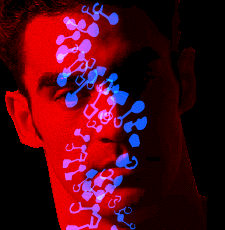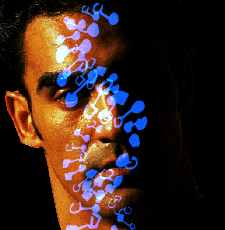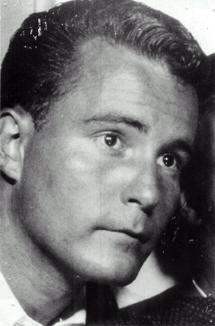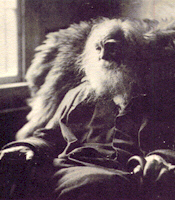 |

 |
|
|
| By Jack Nichols
 In the gene controversy, the approach I've taken since the 1960s puts me�in the minds of some of today's activists/critics-- on a politically-incorrect track. True, I've had a few laughs at the expense of the pompous genetic theorizing that's been defensively called into the service of the gay-lib strategies of the 90s.
In the gene controversy, the approach I've taken since the 1960s puts me�in the minds of some of today's activists/critics-- on a politically-incorrect track. True, I've had a few laughs at the expense of the pompous genetic theorizing that's been defensively called into the service of the gay-lib strategies of the 90s.
Questions arise: (1) Are gay men and lesbians a genetic minority? Or, on the other hand, (2) Do the civil rights triumphs of same-sex love promise a world wherein affection flows unhindered across old-fashioned tabooed boundaries? Some socially 'suspect' people (slight men or hefty women) are influenced possibly by their biological pre-dispositions, spotlighting them unfairly in a compulsively role-strict society and, as a result, they discover that there are natural alternatives to the petulant demands of status-quo eroticism. But many more slight men and hefty women never bother to question social norms and though they may often be suspected by their peers of being gay men or lesbians they become�in typical human see/human do fashion�heterosexually-inclined, nevertheless.
Rejecting the primacy of genes as an explanation for that tabooed but natural inclination we call homosexuality, we can then allow an unaffected curiosity its free reign in human affairs, placing homosexual experience on an equal footing with heterosexual desire. Heretofore nervous activists have feared that the enemies of same-sex love will accuse us of recruitment campaigns. It is time to cast aside this limiting, strategic worry. The enemies of same-sex affection are, in fact, truly the bad guys. In a nuclear age, the socially-induced fear males harbor about drawing close to each other is giving an unnecessary impetus to mutual destruction. One of the earliest of my intuitions, if it can be called such, sets the stage for me to be taken seriously about the genetic debate. John D'Emilio's celebrated history of the movement (Sexual Politics, Sexual Communities: The Making of a Homosexual Minority in the United States, University of Chicago Press, p. 163 ) first mentioned a visionary awareness I pioneered in 1963. He wrote:
This theory makes of gay males and lesbians a nearly separate species. If it were unassailable, it would mean that genetic tinkering might also be able to eliminate�prior to birth-- same-sex desires. But since such desires are not caused by a gene, neither can same-sex love and affection be removed. In a major 1970s work about the severe suffocating limitations males experience due to early-induced role-conditioning (Men's Liberation: A New Definition of Masculinity�Penguin Books) I pointed to the dehumanizing effects of the gay taboo as it affects the development of possibly otherwise affectionate male bonds among men who don't self-identify as gay. Anthropologist Margaret Mead bemoaned what she called "that awful slap on the back"�the only sign of affection allowed between men in the 1950s and the sort for which former President George Bush was famous. It was a clear indication, she felt, that male affection expressed in this way was not living up to its potential. Recognizing rampant macho dehumanization as inculcated early (as when fathers tell 2-year-old males to put up their dukes) and uncovering the underlying purposes of machismo in past centuries�namely to promote warrior-training that's now not only unnecessary but death-dealing, I referred to the gay taboo as the belt-buckle of the macho pose. It is time to unbuckle, I laughed. Why?
 Masculinity in American culture is defined negatively�mostly by a singular prohibition. It isn't what one does so much to be manly as what one doesn't do that seems to count. The singular prohibition is same-sex affection. Scary words like sissy, wus, fag, and gay are the hellfire epithets that enforce machismo's warrior code.
Masculinity in American culture is defined negatively�mostly by a singular prohibition. It isn't what one does so much to be manly as what one doesn't do that seems to count. The singular prohibition is same-sex affection. Scary words like sissy, wus, fag, and gay are the hellfire epithets that enforce machismo's warrior code.
According to this outworn code men must show their abhorrence for any show of same-sex affection that goes beyond the fanny-pats of football fame. In my view, a man who accepts such a circumscribed approach to affection�being horrified by the potential within himself of more expansive same-sex love�becomes, in an obvious a way, like an antsy woman worried that her girdle is about to snap. Once this gay taboo 'belt-buckle' is loosened, however, so likewise is the dorky macho pose. Men begin to relax. Males seem no longer obsessed with the 'sin' of drawing too close emotionally or physically to other males. The potential for same-sex adhesiveness emerges and introduces new life and color to humanity's emotional map. The reason neurotic homophobes get so bent out of shape is that they are battling their own natural tendencies that lead them to feel�as the title of a magnificent new book about gay animals puts it�erotically exuberant. Biological Exuberance is a concept larger than their "small-world" self-images can bear. We live in a nation still sexually-puritanical yet exuberantly sex-curious. Whenever any degree of sexual freedom blooms in a culture�so also does an abundance of human curiosity. Curiosity expands the horizon of consciousness. It's such curiosity that the fundamentalists fear. They fear it in the philosophical realm and they fear it in the precincts of the human body and in their petty, jealous, narrow, closed relationships. If their unscientific world-view is to prevail, they somehow know they can't permit naturally-curious celebrants to "flaunt". That members of the religious Reich themselves are naturally curious shows up in the words of Dr. Paul Cameron�a prominent anti-gay activist, who, in a Rolling Stone interview (March 18) unwittingly made homosexuality sound as perfectly natural as it is: Untrammeled homosexuality can take over and destroy a social system� If you isolate sexuality as something solely for one's own personal amusement, and all you want is the most satisfying orgasm you can get � and that is what homosexuality seems to be � then homosexuality seems too powerful to resist. The evidence is that men do a better job on men, and women on women, if all you are looking for is orgasm�I'm convinced that lesbians are particularly good seducers�People in homosexuality are incredibly evangelical�It's pure sexuality. It's almost like pure heroin. It's such a rush. They are committed in almost a religious way. And they'll take enormous risks, do anything� (Heterosexual marriage?) Generally, it doesn't deliver the kind of sheer sexual pleasure that homosexual sex does. Obviously, this frightened propagandist is fighting tendencies in himself. He would like to see himself as a heterosexual, but his rap is more that of a closety bundle of nerves ready to go the disco round. His state of mind, however, more often than is known, is a common one. Dr. Cameron obviously does not accept that homosexuality is genetic, and that is the one thing I have in common with this anti-gay crusader. Our solutions differ, however, He would fight, as do the proponents of machismo, to repress his natural inclinations. I would tell him, as the wonderful old counterculture slogan of the 60s did, "Make Love, Not War." The "inborn" or genetic theory has often seemed to come in handy�against fundamentalist ravings-- as a gay lib tool. If nature has made a large minority of humans gay, then the fundamentalists can be shorn of their worries about the "prairie fire effect" of homosexuality. Recruitment by gays becomes impossible. But the anti-gays do worry about the prairie fire effect. And because a prevalence of same-sex affection would help spell the end of their absurd world-view (including their unscientific preaching of Creationism which received another blow this weekend with the nearest human-ape ties yet discovered) they feel they must shout homosexuality down. But they're losing the social struggle�as they should. Their taboo is increasingly being flouted and humankind stands currently in the midst of a great human see/human do evolutionary change. Walt Whitman said: "Over the carnage rose prophetic a voice: Affection shall solve the problems of freedom yet."
Such visions as Whitman's point to a fresh new kind of man, said Oscar Wilde. And to a world in which gender becomes an irrelevancy just as long as people of either sex wax affectionate. This cannot happen if homosexuality is limited in its affectionate reach by mere genes. New Findings: The gene theory suffered a major defeat in 1997 when an Australian/American study on twins was announced. Last week, however, yet another study dealt psychobiology and its genetic theory a much better publicized beating. An attempt by scientists to replicate earlier genetic studies, those claiming to have found homosexuality in a small region of one chromosome, failed to uphold gene theory findings. The New York Times (April 23) observed that the quarreling scientists are experiencing difficulty "detecting genes that influence complex behavior."
 In the new study, by a Canadian team and a Stanford University professor, 52 pairs of homosexual brothers were examined. The results "do not support an X-linked gene underlying male homosexuality," they conclude.
In the new study, by a Canadian team and a Stanford University professor, 52 pairs of homosexual brothers were examined. The results "do not support an X-linked gene underlying male homosexuality," they conclude.
Co-author Dr. Neil Risch, Stanford's professor of genetics and statistics, and who performed the statistical analysis for the new study, told the Times: "I feel these findings need to be taken seriously. If there is an effect there, it is pretty small, and this study casts doubt on there being something there in particular. I don't think the evidence for there being an X-linked gene was very strong to begin with." Thank you, Dr. Risch. I hope activists will expand the implications of our revolution by taking note of such recent investigations. The aforementioned Australian/American study�six years in the making�was of both of gay males and lesbians. It included interviews with 4,900 twins and has concluded that homosexuality is as much a product of social conditioning and environment as it is of genetics. These findings were formally presented at a Brisbane seminar in September, 1997 as joint research by senior lecturer at the Queensland University of Technology, Dr. Michael Dunne and Dr. Michael Bailey, of Northwestern University. The seminar was titled "The Social and Ethical Implications of Recent Research into the Genetic Basis of Psychological Diversity." The nurture/nature controversy is not new. Similar instances in interdisciplinary struggles erupted in the 19th century with like studies on twins and other gay males utilized as "proofs" of one view or another, just as occurs today. For an extended period social constructionist views had prevailed. This prevalence was temporarily interrupted by the assertions advanced by early 90s biologists. Now, with the release of the Canadian/American and the Australian/American research, constructionist views are once again being returning to the fore. These new studies challenges the biological, or genetic assumptions launched in 1991 after a gay-identified researcher, Simon LeVay, resurrected the century-old struggle between biological and psychological theorists by advancing biological perspectives concerning homosexual origins based mainly on autopsies he'd completed on 19-AIDS-felled corpses. LeVay had found, he said, a larger hypothalamus in heterosexually-identified males than in homosexual males. Mainstream media and a great number of gay activists who lacked awareness of long-existing interdisciplinary battles, quickly seized upon LeVay's research to bolster a strategy needed to fell religious fundamentalist propaganda about the 'gay scare' or homosexual contagion in the general population. They hoped that LeVay's support for the "inborn" argument might help quell fundamentalist claims that the lifting of the homosexual taboo would automatically lead to "perverse" mass conversions to same-sex love. Thus, many gay activists became enthusiastic purveyors of the theory of genetic causation. Obviously they have not thought to hope for a more radical expansion of affection.
He pointed out to me in 1991 how academic schools of psychobiology that LeVay represents are "forever trying to reassert jealous dominion over human behavioral patterns." The latest research, which calls such "findings" into question, backs up Dr. Weinberg's contention. Weinberg referred to LeVay's research as "garbage", explaining that psychology and biology's theoretical warring brought about by the latter group's "psychobiological binges" are forever erupting and getting front page play, and that later they "fade into the backdrop of our collective memory, and are never again reconsidered as they move on into the limbo of perpetual non-importance." When asked what lies behind biological research such as LeVay's, Weinberg replied, "These theories will be propounded as long as conventional citizens want to explain human differences rather than celebrate them." Dr. Weinberg expanded on his point: "We come into this world with no innate selection preferences or knowledge of the outside world. To assert a preference for one sex-object would be to assert a much larger 'first' for human beings, namely the discovery that we are born with ANY knowledge of this world." Biology, as feminist scholarship has long contended, is not, therefore, necessarily destiny. If it were, human social evolution would remain status-quo-stunted by mere biological fiat. The Australian researcher, Dr. Dunne, believed his 1997 studies showed "it's pretty clear that the expression of something like sexuality really depends upon the time in which you live." He said that evidence of sexuality in women was much less certain, but that nurture as well as nature was a factor with both sexes. Studies show that women, far more so than men, tend to be changeable and fluid in their sexual responses, that is that many respond homosexually or bisexually with greater ease. The reason for this may be that the homosexual taboo has been emphasized far more pointedly among men than among women. Greater elasticity among females exists, I tend to believe, simply because women have not been browbeaten with such 'hellfire' terms as "sissy" like men are, or warned by peers and parents about getting too close to each other. I don't claim expertise when it comes to women, however. Whether or not female fluidity signals social or biological impetus is part of the ongoing interdisciplinary debate. About genetic influences, Dr. Dunne said that "it looks like, for most human traits, it's very unlikely that there is any single gene influence, so it might be the case that you're going to need a number of genes, and also particular types of environment for that trait (of homosexuality) to express itself." The understandable fears voiced by activists that nurture arguments open the door to fundamentalist demands for "therapeutic" changeovers to heterosexuality are either cancelled or balanced in the long run-by the new research, as Dr. Dunne explains. Explanations of homosexual origins based on biological arguments also have their downside, as mentioned earlier: namely,the possibility of genetic manipulation, or "selecting against gay babies while they are still in the womb." Elimination of such erotic desire during the years following a child's birth is problematic. In 1951 Edward Sagarin, writing under the pseudonym Donald Webster Cory, argued that once intense pleasure has been derived from same-sex contact, no therapy could eliminate the pleasured individual's recognition of the source of his or her pleasure. Therefore, he argued, homosexuality cannot be eliminated. The research conducted by Dr. Alfred Kinsey posited homosexuality as one side of the natural sexual continuum. The 1948 Kinsey studies indicated that 37.5 percent of all males (heterosexual or homosexual) reach at least one orgasm homosexually in adulthood. Clearly, in sexually repressive societies, there are fewer overt same-sex lovers. As taboos are lifted, some now believe the natural homosexual component in human beings becomes increasingly expressive. This view challenges old theories and brings into focus what both psychologist William James and psychoanalyst Sigmund Freud taught about the human psyche, namely that it is, at birth, bisexual. Two 19th Century gay pioneers, poets Walt Whitman and Edward Carpenter, reflected parallel perspectives. "The germ (i.e. seed) is in everyone," said Whitman, while Carpenter reflected in 1896: "It is possible that the Uranian (gay) spirit may lead to something like a general enthusiasm of Humanity, and that the Uranian people may be destined to form the advance guard of that great movement, which will one day transform the common life by substituting the bond of personal affection and compassion for the monetary, legal, and other external ties which now control and confine society. Such a part, of course, we cannot expect the Uranians to play unless the capacity for their kind of attachment also exists, though in a germinal and undeveloped state, in the breast of mankind at large. And modern thought and investigation are clearly tending that way-to confirm that it does so exist."  GayToday's Senior Editor is author of The Gay Agenda: Talking Back to the
Fundamentalists, published by Prometheus Books. GayToday's readers
may order this book for $18.87, a 30% discount off of the regular price of
$24.95. Of this book Dr. Rodger Strietmatter, author of Unspeakable: The
Rise of the Gay & Lesbian Press in America, says: "Jack Nichols' intense
passion and graceful writing style combine to create rousing messages
reminiscent of the inspirational words written by Thomas Paine two centuries
ago." To order The Gay Agenda on-line explain that you would like a GayToday
reader's discount: pbooks6205@aol.com
GayToday's Senior Editor is author of The Gay Agenda: Talking Back to the
Fundamentalists, published by Prometheus Books. GayToday's readers
may order this book for $18.87, a 30% discount off of the regular price of
$24.95. Of this book Dr. Rodger Strietmatter, author of Unspeakable: The
Rise of the Gay & Lesbian Press in America, says: "Jack Nichols' intense
passion and graceful writing style combine to create rousing messages
reminiscent of the inspirational words written by Thomas Paine two centuries
ago." To order The Gay Agenda on-line explain that you would like a GayToday
reader's discount: pbooks6205@aol.com
|

© 1997-99 BEI
 GayToday Senior Editor Jack Nichols, pictured here in 1962, fought against the classification of homosexuality as a disease
GayToday Senior Editor Jack Nichols, pictured here in 1962, fought against the classification of homosexuality as a disease 
 Dr. George Weinberg
Dr. George Weinberg